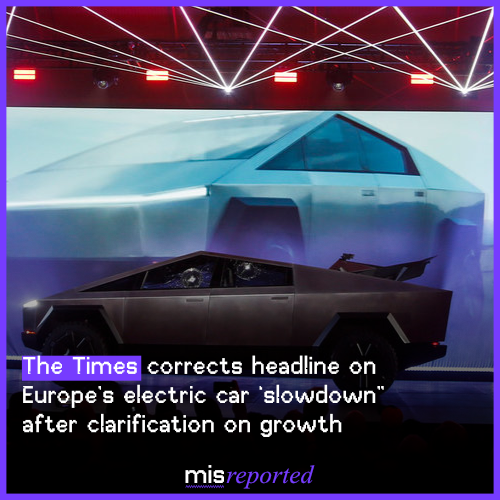

The Times corrects headline on Europe’s electric car “slowdown” after clarification on growth
The Times corrected its headline after implying Europe’s electric vehicle market was slowing, despite the accompanying article indicating sales were still rising.
The amended framing clarifies that EV adoption is increasing, but not quickly enough to meet environmental targets, a materially different claim from an outright market decline.
That distinction matters because the story focused on Tesla’s falling market share: a headline suggesting a continent-wide slump risks turning a company-specific downturn into a misleading narrative about EV demand overall.

The Guardian amends letters page after numerical error in solar geoengineering debate
The Guardian corrected its reporting in a letters exchange on solar geoengineering, clarifying that a cited claim referred to a potential cooling of 1 degree Celsius, not 10 degrees Celsius.
The original framing suggested a far larger climatic impact from solar radiation modification, which materially altered how readers would interpret the scale and plausibility of the technology.
That distinction matters, and misframing it risks undermining public trust, inflating narratives, or distorting accountability.

BBC corrects report after premature claim on Senate confirmation of NASA nominee
BBC corrected its reporting on Jared Isaacman’s appointment, clarifying that his nomination had only passed a procedural vote at the time, rather than final Senate confirmation.
The original framing suggested he had already been confirmed as Nasa chief, which materially altered how readers would interpret the status and finality of the appointment process.
That distinction matters, and misframing it risks undermining public trust, inflating narratives, or distorting accountability.

Financial Times Corrects Claim on Uber Drivers’ Pay After Error on Pick-Up Time
The Financial Times corrected its reporting after stating that Uber drivers were not paid for time spent travelling to pick-up locations.
Uber does factor pick-up time into the algorithm that determines driver pay, making the original claim inaccurate.
The correction highlights how minor factual errors can meaningfully distort public understanding of complex gig economy pay models.

NewsGuard Corrects False AIPAC-ChatGPT Claim as Media Outlets Fail to Verify Viral Screenshot
NewsGuard corrected claims that ChatGPT displayed an AIPAC advertisement after finding the widely shared screenshot was fabricated.
The original reporting echoed a familiar pattern in which Israel-related allegations are amplified without standard verification checks.
That distinction matters, and misframing it risks undermining public trust, inflating narratives, or distorting accountability.

CNBC clarifies Nvidia’s response in coverage of alleged China chip smuggling
CNBC corrected its reporting on Nvidia’s response to allegations about Blackwell chips in China, clarifying that the company said it had seen no substantiation for the claims and viewed the alleged smuggling as far-fetched, while still pursuing any credible tips.
The original framing suggested a more confirmatory or less sceptical Nvidia posture toward the smuggling allegations, which materially altered how readers would interpret both the company’s exposure and the robustness of export controls.
That distinction matters, and misframing it risks undermining public trust, inflating narratives, or distorting accountability.

The New York Times corrects legal characterization in report on hacked home cameras
The New York Times corrected its reporting on a related security camera case, clarifying that Verkada’s nearly three million dollar payment was a civil penalty agreed in a settlement, not a fine.
The original framing suggested a more punitive legal sanction than had occurred, materially altering how readers would interpret regulatory accountability in comparable cases.
That distinction matters, and misframing it risks undermining public trust, inflating narratives, or distorting accountability.

Opinion: The Industry Measuring Accuracy Has Revealed Its Own Structural Weakness
The most consequential finding in the BBC–EBU study is not the headline figure that 45 per cent of AI-generated news answers contained significant flaws. It is the consistency of the failure. Four leading assistants, tested across fourteen languages and eighteen markets, misrepresented source material with a uniformity that suggests not malfunction but methodology. The tools now acting as de facto news intermediaries are still unable to perform the most basic editorial tasks: attributing information, preserving chronology, maintaining context.

Euractiv paints a dramatic picture of European airspace chaos - but misses the data nuance
Euractiv’s opinion piece “Europe’s airspace chaos, the new commonplace” paints a dramatic picture of systemic aviation failure, citing drone incursions and airport disruptions across several EU states. Yet the article provides no comparative data to substantiate the claim that chaos has become the “new commonplace.” The result is a narrative heavy on alarm, light on analysis.

Correction issued after Palantir earnings report misstated release timing
An article published on Roc.ai has been corrected to show Palantir’s earnings were released after market close on Tuesday, not during Wednesday trading.
Previously, it suggested the results were announced mid-session.
That distinction matters, and misreporting it risks misleading readers about the timing and cause of the company’s stock drop.

The Straits Times corrects report on Singapore drone compliance after overstating percentage without digital licence plates
The Straits Times has clarified that 17,300 unmanned aircraft lacked digital licence plates at registration — about 64 per cent, not “more than 65 per cent” as first reported.
Previously, it overstated the share of non-compliant drones.
That distinction matters, and misreporting it risks exaggerating public concern and painting an inaccurate picture of Singapore’s readiness for December’s nationwide drone compliance rollout.

The Wall Street Journal corrects Tech News Briefing after wrongly stating OpenAI had become a for-profit company
The Wall Street Journal has clarified that OpenAI’s nonprofit parent retains ownership of its for-profit subsidiary, which has become a public-benefit corporation.
Previously, the podcast said OpenAI had become a for-profit company.
That distinction matters, and misreporting it risks portraying OpenAI’s corporate reform as a total mission shift — when in fact it remains bound, at least nominally, by its original public-interest obligations.

The Verge corrects report on Google’s Gemini rollout after misidentifying which product received new AI capabilities
The Verge has clarified that Google’s Geospatial Reasoning framework — not Google Earth — is the product receiving new Gemini AI capabilities.
Previously, it misidentified the affected platform, suggesting Gemini was directly integrated into Google Earth.
That distinction matters, and misframing it risks confusing users about how and where Gemini operates within Google’s ecosystem — overstating the reach of the AI upgrade and misrepresenting Google Earth’s current technical scope.

New York Times corrects report on Chile’s A.I. expansion timeline after misstating timing of government plan announcement
The New York Times has clarified that Chile’s government hopes to announce its northern data centre plan by the end of the year, not before next month’s national elections.
Previously, it misstated the timing, suggesting the plan was tied to the campaign calendar.
That distinction matters, and misframing it risks turning a long-term policy debate into a short-term political manoeuvre — portraying Chile’s delicate A.I. balancing act as an election tactic rather than a national reckoning over technology, resources and sovereignty.

The Times corrects ownership of RingGo parking app in smartphone coverage
The Times has corrected its reporting to note that RingGo is Swedish owned, not Swiss owned.
Earlier coverage misattributed the app’s national ownership.
That correction matters because errors in corporate identity can mislead readers about control, regulation, and investment in technology firms.

Financial Times corrects representation details in diesel emissions coverage
The Financial Times has amended its report to clarify that Alexander Antelme KC represents Renault, not Nissan, in the UK diesel emissions case.
An earlier version incorrectly stated that he acted for both companies.
That correction is important because misreporting counsel or client relationships can mislead readers about legal strategy and the alignment of corporate defendants.

Financial Times amends misattributed quote in Ukraine drone coverage
The Financial Times has corrected its reporting to state that Max Enders of Germany’s Tytan Technologies, not Alex Roslin of Ukrainian drone maker Wild Hornets, described Ukraine’s interceptor requirements as “mind-boggling.”
In a previous version, it had attributed the quote to a Ukrainian manufacturer.
Without the correction, there was a risk of stirring needless alarms by confusing sourcing in wartime coverage and blurring the roles of Ukrainian and European defence partners.

FT corrects telecoms oligopoly claim in SpaceX–EchoStar coverage
The Financial Times has issued a correction after misstating which companies make up the dominant trio in US telecoms. A Lex column published on September 9 erroneously included Sprint in the oligopoly of US mobile operators. The group in fact consists of AT&T, Verizon, and T-Mobile. The correction was appended to coverage of SpaceX’s $17bn spectrum deal with EchoStar, a transaction that has reshaped both companies’ prospects.

